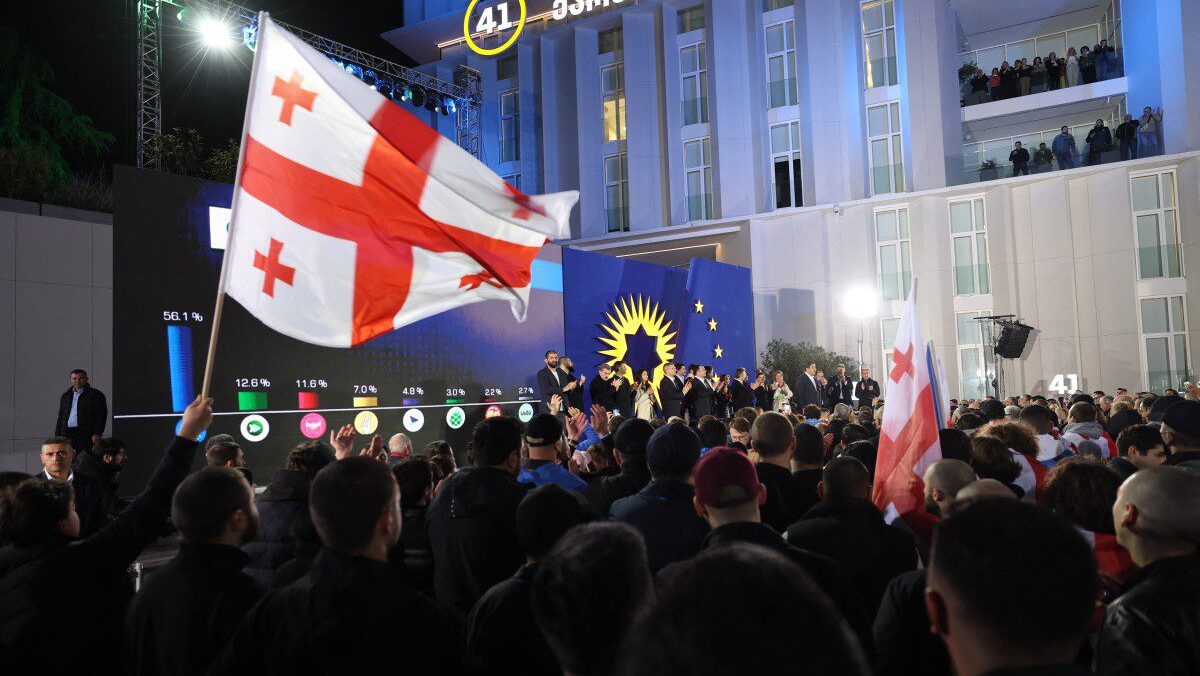
Supporters and members of the ruling Georgian Dream party attend a gathering at the party’s headquarters after exit polls were announced during parliamentary elections in Tbilisi on October 26, 2024.
Photo: Giorgi ARJEVANIDZE / AFP
European Union officials and Western liberals have questioned the legitimacy of Saturday’s parliamentary elections held in Georgia, which the governing conservative Georgian Dream party won with 54% of the vote. The victory of the sovereigntist anti-woke and anti-war party has drawn the ire of the EU, which is threatening to derail the eastern European country’s EU accession bid. Meanwhile, the pro-Brussels opposition is preparing to protest the results.
According to the official results announced on Sunday, the ruling party, which has been in power for the past twelve years, won 54% of the votes, gaining 89 seats in parliament. The four pro-Brussels political alliances, who have vowed to work together to oust the government, got 38% and 61 seats.
“Our victory is impressive,” Prime Minister Irakli Kobakhidze said, accusing the opposition of “undermining the country’s constitutional order” by questioning his party’s victory.
Georgia, national parliament election:
— Europe Elects (@EuropeElects) October 27, 2024
3,100/3,111 precincts counted
GD~S&D|ECR: 54.1% (+1.1)
CfC-RE: 10.9% (-0.3)
Unity-EPP|RE: 10.1% (+0.2)
SG-RE: 8.8% (-0.2)
ForGeo~EPP: 7.8% (-0.4)
Girchi~NI: 3.0% (-0.2)
AP~ECR: 2.4% (-0.1)
LP-*: 0.7% (-0.1)
+/- vs. 2,239/3,111 precincts… pic.twitter.com/6ivcBKmEt6
The opposition is not willing to recognise the results, saying the elections were “stolen.” Georgian President Salome Zourabichvili, who has been active in trying to bring the opposition parties together, called for the citizens of her country to protest against the results on Monday night.
“It was a total fraud,” she pronounced, calling the election a “Russian special operation.”
The governing Georgian Dream party has been labelled “pro-Russian” for simply trying to maintain a pragmatic relationship with neighbouring Russia, as well as being unwilling to follow the EU’s suit on imposing sanctions on Moscow. It has also called for peace talks to end the war in Ukraine, echoing the positions of Hungarian conservative leader Viktor Orbán, who has been chastised in Western liberal circles for his anti-war rhetoric.
Though international observers stopped short of calling the outcome of the elections fraudulent, they mentioned alleged violations, including ballot stuffing, bribery, voter intimidation, and violence near polling stations. The electoral commission said the election was free and fair. A parallel count operated by one of the opposition parties showed Georgian Dream in a strong position to win a majority, Reuters reported.
Nevertheless, European Council President Charles Michel called on Georgian authorities to “seriously clarify and address” alleged irregularities. He said the topic would be put on the agenda at an EU summit on November 8th. Both he and other Western countries, such as France and Germany, warned Georgia that it must demonstrate its willingness to remain on the “European path”—a clear threat that Brussels is willing to derail the country’s EU accession if it doesn’t do as it is told.
Following the parliamentary elections in Georgia, I intend to put Georgia on the agenda of the informal #EUCO in Budapest.
— Charles Michel (@CharlesMichel) October 27, 2024
We note the OSCE/ODIHR preliminary assessment and call on the Central Election Commission and other relevant authorities to fulfil their duty to swiftly,…
The country applied for EU membership two years ago and was granted candidate status in December of last year. Though the governing party and the prime minister are committed to Georgia joining the EU by 2030, Brussels froze the accession process earlier this year after the country’s parliament voted in favour of a foreign interference law, which obliges NGOs and media outlets receiving more than 20% of their funding from abroad to register as “pursuing the interests of a foreign power.” Though the law was based on other similar Western laws, the government was accused of following in the footsteps of Moscow.
As we reported, Georgian Dream has drawn the ire of the liberal globalist elites for its insistence on embracing Christian and conservative values, and for adopting an anti-LGBT propaganda law, aiming to safeguard traditional family values.
The conservative government of Hungary, which has been criticised for similar ‘offences,’‘ congratulated Georgia Dream on the party’s victory. “The people of Georgia know what is best for their country, and made their voice heard today,” PM Viktor Orbán wrote on X.
Congratulations to Prime Minister @PM_Kobakhidze and the Georgian Dream party on their overwhelming victory at the parliamentary elections today. The people of #Georgia know what is best for their country, and made their voice heard today!
— Orbán Viktor (@PM_ViktorOrban) October 26, 2024
Foreign Minister Péter Szijjártó said criticism by Brussels and the liberal mainstream media was “nothing new under the sun,” but the fact remains that “the sovereign, peace-focused, family-oriented ruling party that openly prioritises national interests” won the elections.
🇬🇪🇭🇺 "Nothing new under the sun: on Saturday, it wasn’t Brussels’ or the liberal mainstream’s designated winners who took the election in Georgia, but the sovereign, peace-focused, family-oriented ruling party that openly prioritizes national interests," stated FM Péter… pic.twitter.com/duQKfcIm1E
— Zoltan Kovacs (@zoltanspox) October 28, 2024
Orbán, Szijjártó, and other members of the Hungarian government will make an official visit to Georgia on Monday and Tuesday.
Pro-Brussels media outlet Politico is already sounding the alarm over the visit, claiming that Orbán could try and make it look as if he is representing the EU during his negotiations in Tbilisi. Hungary currently holds the rotating six-month EU presidency, and the Hungarian PM was accused of holding talks in the name of the EU during his ‘peace tour’ in Kyiv, Moscow, Beijing, and Washington D.C. in July, even though Orbán made it clear he was only representing Hungary.
